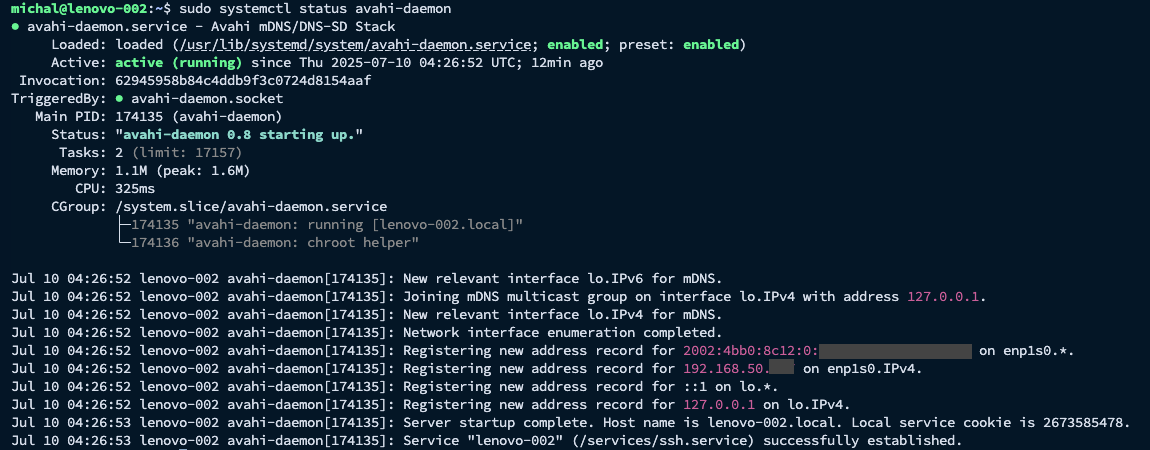Configure mDNS for Hostname Resolution on Ubuntu

Enable your Ubuntu servers to be accessed via hostname.local (e.g., ping yourservername.local or ssh username@yourservername.local) using Avahi for Zero Configuration Networking (Zeroconf). This is perfect for local networks, like my setup with pi5server, pi4server, and pi3server.
Install Avahi
Install the mDNS daemon and tools:
sudo apt update
sudo apt install avahi-daemon avahi-utils libnss-mdns
- avahi-daemon: Handles mDNS and service discovery.
- avahi-utils: Provides tools like avahi-browse.
- libnss-mdns: Enables .local resolution in the system.
Verify Avahi Service
Ensure Avahi is running:
sudo systemctl enable avahi-daemon
sudo systemctl start avahi-daemon
sudo systemctl status avahi-daemon
Look for active (running) in the output.
Configure Hostname
Set a unique hostname for each server:
sudo hostnamectl set-hostname yourservername # Replace with your hostname
Update /etc/hosts to include the hostname:
sudo nano /etc/hosts
Add or verify:
127.0.0.1 localhost
127.0.1.1 yourservername # Replace with your hostname
Save and exit (Ctrl+O, Enter, Ctrl+X).
Advertise SSH Service
Allow SSH discovery via mDNS:
sudo nano /etc/avahi/services/ssh.service
Add:
<?xml version="1.0" standalone='no'?>
<!DOCTYPE service-group SYSTEM "avahi-service.dtd">
<service-group>
<name replace-wildcards="yes">%h</name>
<service>
<type>_ssh._tcp</type>
<port>22</port>
</service>
</service-group>
Restart Avahi:
sudo systemctl restart avahi-daemon
Configure Client for mDNS
On the client device accessing the server:
- Linux (Ubuntu, etc.): Install
libnss-mdns:
sudo apt install libnss-mdns
Edit /etc/nsswitch.conf:
sudo nano /etc/nsswitch.conf
Ensure the hosts line includes:
hosts: files mdns4_minimal [NOTFOUND=return] resolve [!UNAVAIL=return] dns
- macOS: Built-in Bonjour support, no action needed.
- Windows: Install Bonjour (via iTunes or standalone) or use an mDNS-capable SSH client like Termius.
- iOS/Android: Use an mDNS-capable SSH app like Termius.
Test mDNS Resolution
From a client on the same network (e.g., 192.168.x.x):
ping yourservername.local
ssh <username@yourservername.local>
Verify services:
avahi-browse -a
Look for entries like:
+ eth0 IPv4 pi5server [hostname] _ssh._tcp local
Troubleshooting
- Same Subnet: Ensure client and server are on the same network (e.g.,
192.168.x.x). - Firewall: Allow mDNS traffic:
sudo ufw allow 5353/udp
- Resolution Fails: Check Avahi logs:
journalctl -u avahi-daemon
🧠 Notes
Ensure SSH is enabled (sudo systemctl enable ssh; sudo systemctl start ssh).